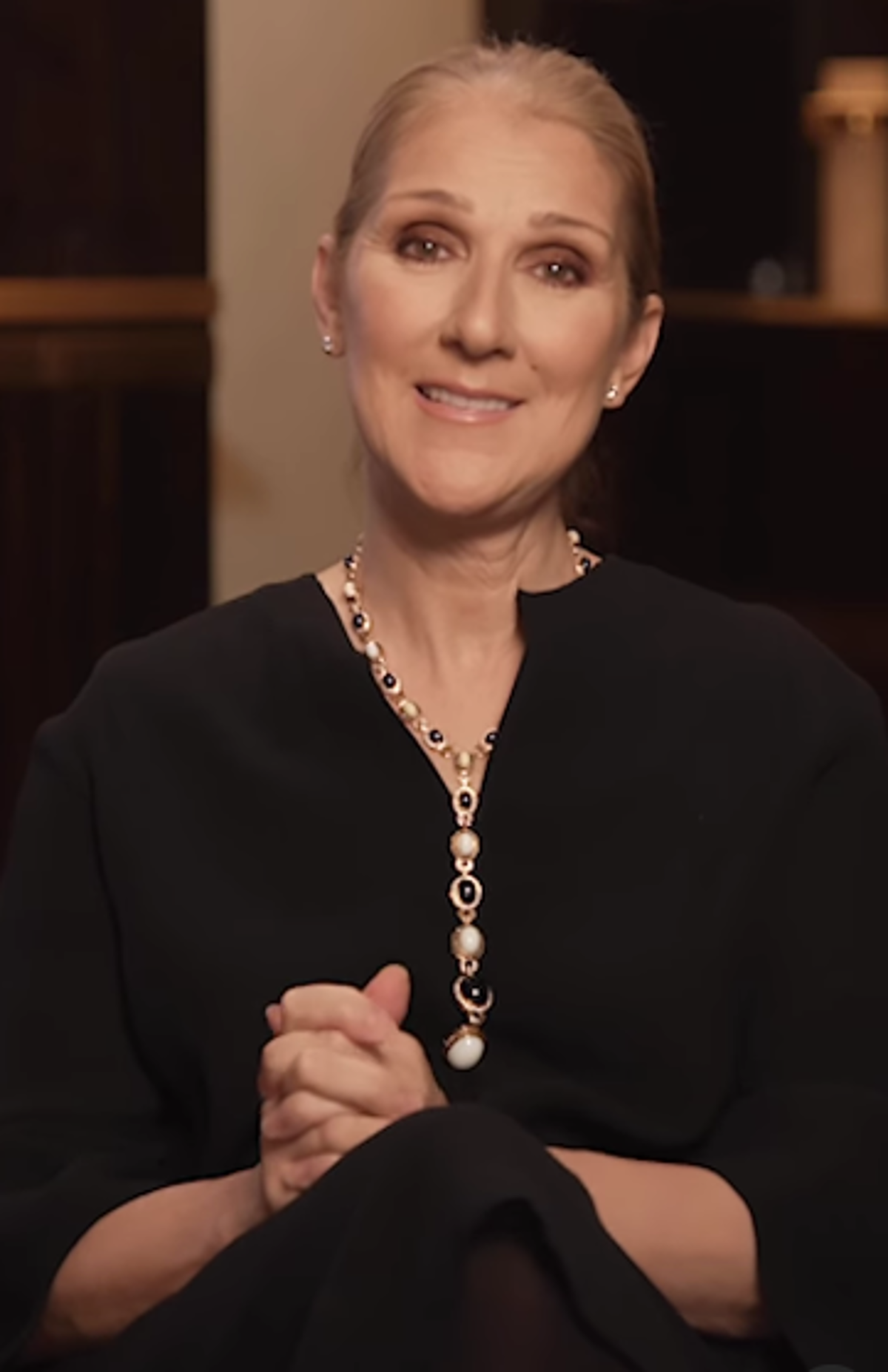Celine Dion's Struggle to Adjust to Stiff Person Syndrome
- Celine Dion’s sister, Claudette, has offered some more insight into the “My Heart Will Go On” singer’s battle with stiff-person syndrome (SPS), a rare neurological disorder she was diagnosed with late last year.
- The diagnosis prompted Dion to postpone and/or cancel several concerts scheduled for this spring and summer.
- Being diagnosed with a serious illness, like cancer or a rare disease, and going through the treatment process can be incredibly stressful. It's normal to feel anxious, scared, sad, and so much more.
- One way to get your mental health back in check after a diagnosis is to try to play up your strengths, Dr. Samantha Boardman, a New York-based psychiatrist and author, tells SurvivorNet and to seek out help and connection if you need it.
The 55-year-old “Queen of Power Ballads” recently had her sister, Linda, move in to help as she works to rehabilitate her body in her Las Vegas home. Now, another one of her siblings, Claudette, has shared an update about Dion’s condition.

“At one point, your heart and your body are trying to tell you something. It’s important to listen to it.”
Hopeful Stories From Cancer Survivors
- 6 Cancer Survivors Tell Us How They Stay Hopeful During Difficult Times
- Michael J. Fox’s Determination to Remain Positive During Decades-Long Parkinson’s Journey Shows Cancer Patients the Importance of Optimism
- ‘Positive Thinking Is Half the Battle’: Jillian Barberie, 54, Says She Gets Screened for Cancer Every Three Months After Having a Double Mastectomy Three Years Ago
- Ann Miller, Actress from Hollywood’s ‘Golden Age’ of Cinema, Stayed Hopeful During Lung Cancer Fight; Why Hope Matters
- Resilience: Staying Positive Despite Adversity
Claudette and Linda and just two of Dion’s 14 older siblings: Denise, Clément, Liette, Michel, Louise, Jacques, Daniel, Ghislaine, Linda, Manon, and twins Paul and Pauline.
It’s clear Dion’s receiving the utmost support from family during this difficult time, especially as she also has her three sons René-Charles, Eddy, and Nelson by her side.
Claudette’s recent chat with Le Journal de Montreal comes after she reportedly appeared on Canadian TV show, “Bonsior Bonsior,” where she explained she knows her sister is “working hard.”
“We're crossing our fingers and I'm glad people are concerned,” she said. “We are confident that we will succeed. It can't be a story like this.”

When Dion, who released a new single earlier this year for the romantic comedy movie “Love Again,” first announced her diagnosis, she told fans her Spring 2023 shows had been rescheduled to 2024a time when the star aspires to get better and return to performing, so it’s clear she’s maintaining an optimistic outlook on her situation.
Celine Dion’s Battle With Stiff-Person Syndrome
Back in December 2022, Dion revealed that she was diagnosed with stiff-person syndrome. The diagnosis prompted her to postpone and/or cancel several concerts scheduled for this Spring and Summer due to her heartbreaking diagnosis.
In her Instagram video announcement, Dion informed her fans, “I've been dealing with problems with my health for a long time and it's been really difficult for me to face these challenges and talk about everything that I've been going through.
"I have a great team of doctors working alongside me to help me get better and my precious children, who are supporting me and giving me hope.”
Stiff-person syndrome (SPS) is described as a rare neurological disorder with features of an autoimmune disease, that is “characterized by fluctuating muscle rigidity in the trunk and limbs and a heightened sensitivity to stimuli such as noise, touch, and emotional distress, which can set off muscle spasms,” the National Institutes of Health explains.
The NIH notes that people with this diseasewhich has been found to affect twice as many women as menare often seen with unusual postures, with their backs hunched over and stiffened.
“It is frequently associated with other autoimmune diseases such as diabetes, thyroiditis, vitiligo, and pernicious anemia. Scientists don't yet understand what causes SPS, but research indicates that it is the result of an autoimmune response gone awry in the brain and spinal cord,” the NIH says.
“The disorder is often misdiagnosed as Parkinson's disease, multiple sclerosis, fibromyalgia, psychosomatic illness, or anxiety and phobia.”
“A definitive diagnosis can be made with a blood test that measures the level of glutamic acid decarboxylase (GAD) antibodies in the blood. People with SPS have elevated levels of GAD, an antibody that works against an enzyme involved in the synthesis of an important neurotransmitter in the brain,” the medical research agency adds.
According to Johns Hopkins Medicine, symptoms associated with the rare, progressive neurological disorder include:
- Painful muscle contractions
- Muscle spasms (which often begin in the legs or back)
- Difficulty walking
- Unsteadiness and falling
- Shortness of breath
Although the disorder isn’t curable, people with this disease can be treated with “IVIg, anti-anxiety drugs, muscle relaxants, anti-convulsants, and pain relievers” to help control symptoms. Symptoms can sometimes include falling due to a lack of their body’s normal defensive reflexes.
“People with SPS respond to high doses of diazepam and several anti-convulsants, gabapentin and tiagabine. A recent study funded by the NINDS demonstrated the effectiveness of intravenous immunoglobulin (IVIg) treatment in reducing stiffness and lowering sensitivity to noise, touch, and stress in people with SPS,” NIH explains.
Have a Rare Disease? Here are Some Resources
All sorts of feelings of anxiety, fear, and loneliness can come with the diagnosis of a rare disease. But it's important to know you're not alone. Below are some helpful resources for the many people affected by lesser-known or less-researched diseases.
Academic Centers and Comprehensive Care Centers
For some rare disease warriors, community centers provide great treatment options. But for people with rare conditions cancer or otherwise more specialized care may be required. In that case, the most effective place to find a specialist is often at academic centers and comprehensive care centers.
In a previous conversation with SurvivorNet, Dr. Kenneth Miller, director of outpatient oncology at the University of Maryland's comprehensive cancer center, explained what differentiates a "comprehensive cancer center" from other treatment providers.
Seeking Care at a Comprehensive Cancer Center
"Pretty much automatically, there's going to be a team approach [to your care]," Dr. Miller said. "Surgical oncology, medical oncology, radiation oncology, and all the support services and also wonderful pathology and radiology."
Dr. Miller added that at a comprehensive cancer center, all of these different specialists work together as a team to help you find the best course of treatment for your specific kind of cancer.
"We call it a tumor board a group to go through all the details of your case … so you get a group of very smart people coming up with a plan together that is hopefully optimal and gives you the best chance of doing well."
Clinicaltrials.gov and the SurvivorNet Clinical Trial Finder
Another place to turn to when you've been diagnosed with a rare disease and you're considering experimental treatment )or trying to find specialists) is clinicaltrials.gov a database maintained by the U.S. government that compiles privately and publicly funded clinical trials conducted around the world.
Clinical trials themselves are research studies that compare the most effective known treatment for a specific type or stage of a disease with a new approach.
Clinical Trials Can be Life-Saving for Some
Clinicaltrials.gov can help you explore possible treatment options by looking at trials that are actively recruiting. The site also provides the information of some of the most specialized doctors in a specific field since they often end up leading clinical trials that advance our understanding of diseases.
By searching your disease on Clinicaltrials.gov, you will usually come across a list of many studies. The lead researcher will be listed under the heading, "Investigators." Lead researchers in studies on rare diseases are typically doctors who have specialized in the study of that condition.
And if you'd prefer to search for clinical trials on a more user-friendly site, try SurvivorNet's new A.I. driven tool built on top of clinicaltrials.gov: the SurvivorNet Clinical Trial Finder. This tool is updated daily and gives users access to more than 100,000+ individual clinical trials to help them find treatment options.
To use the SurvivorNet Clinical Trial Finder, simply answer some basic questions using our custom-designed chat feature and we'll send clinical trial options within your region right to your email. In simplifying the search, we hope to offer multiple opportunities for clinical trial sponsors and clinical research organizations to engage with patients.
"Clinical trials are critical to the development of new therapies, and as we live through this extraordinary revolution in genomics, immunotherapy and targeted therapy, it's clear that one of the most pressing needs for patients, clinical trials sponsors, and researchers is simply a better way to find patients," SurvivorNet CEO Steve Alperin said. "Even one percent more people successfully enrolled in clinical trials can change the world."
PubMed
Similar to clinicaltrials.gov, PubMed is another place to turn if you're looking to research your rare disease. This website includes more than 33 million citations for biomedical literature from MEDLINE, life science journals, and online books.
If you type in your disease, you'll see a list of studies and articles about the condition. You can even add a filter to only look at clinical trial information. By looking at the doctors associated with the published clinical trial results and other articles, you may be able to find doctors that specialize in research for your disease.
Newly-Developed Drugs
For those who've been recently diagnosed with a rare disease, we also want to highlight reasons for hope since there is something of a revolution going on in the development of drugs for rare diseases.
The sequencing of the human genome has enabled doctors to take new approaches to treating some of these uncommon conditions. One step you may take after being diagnosed with a rare disease is looking into the drug companies developing drugs to treat your condition.
Compassionate Use and Off-Label Use
Drug companies may be able to help patients enroll in clinical trials, and in some rare cases, they may even be able to offer "compassionate use." Compassionate drug use makes a new drug that has not been fully approved available to a patient facing a serious illness. This only typically happens when a patient has exhausted all other treatment options, but it is an important option to understand.
Similarly, researching drug companies may be a path to "off-label" drug use. Off-label drug use involves taking a drug that has been approved for treating one condition in the hopes that it may treat another condition that it has not yet been approved for.
Overcoming Adversity
Getting a new diagnosis whether it’s cancer or a rare disease like Celine Dion and going through the treatment process can be incredibly stressful. It's completely normal to feel anxious, scared, sad, and so much more. The disease is a mental challenge as well as a physical one.
Facing Cancer: How to Turn Stress into Strength
One way to get your mental health back in check after a diagnosis is to try to play up your strengths, Dr. Samantha Boardman, a New York-based psychiatrist and author, previously explained to SurvivorNet.
"I sometimes will ask patients, tell me about yourself when you were at your best," she explained. "Using that story, trying to figure out what strengths come to mind … is it patience? Is it appreciation of beauty? It is perseverance? [Then we can] use those strengths in constructive ways to navigate their cancer journey."
Dr. Boardman said another way to approach harnessing the strength you already have is by tapping into your values. This could be family, close friendships, spirituality, or commitment to a healthy lifestyle.
Reminding yourself of what your values are and how you are living accordingly is another way to unleash that inner strength.
Lastly, patients shouldn't underestimate the value of simply opening up, Dr. Boardman said. This could mean speaking to a close family member or friend, or it could mean seeking support in other ways by finding a therapist that meets your needs or looking into joining a support group.
Having negative feelings throughout your health journey is to be expected, however, doctors will tell you that people who find a way to work through the emotions and stay positive tend to have better outcomes.
"A positive attitude is really important," Dr. Zuri Murrell, a colorectal surgeon at Cedars-Sinai Medical Center in Los Angeles, previously told SurvivorNet.
"I'm pretty good at telling what kind of patients are going to still have this attitude and probably going to live the longest, even with bad, bad disease. And those are patients who, they have gratitude in life."
Contributing: SurvivorNet Staff
Learn more about SurvivorNet's rigorous medical review process.


